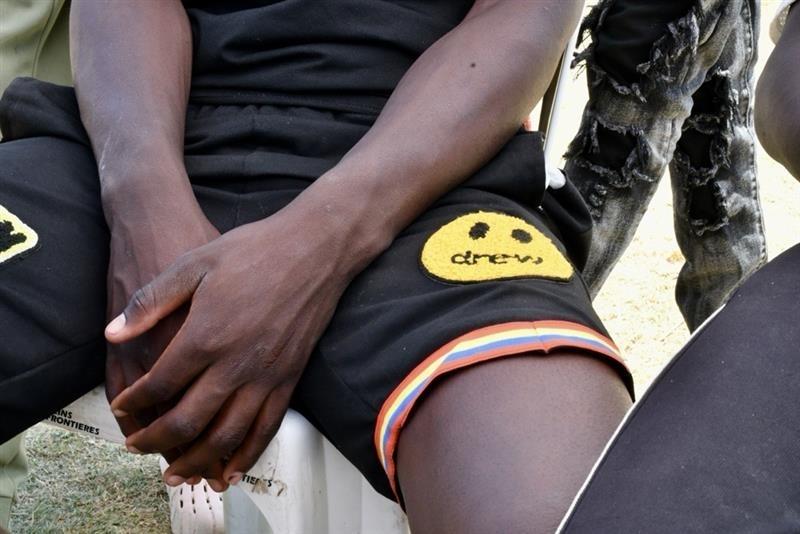Overcoming Mental Health Challenges in Zimbabwe
Under the scorching sun in Epworth, a suburb of Harare, 20-year-old Peter Chimntanda reaches out to young people facing mental health challenges, sharing information about the mental health and psychosocial support provided by Doctors Without Borders (MSF) in Zimbabwe. As a peer educator with MSF, Peter understands the challenges many of his peers face, having experienced similar struggles himself a few years ago.
.png)
“Sometimes I just cried in the darkness,” Peter recalls his struggles at 14, weighed down by school pressures and family issues. “Especially at school, when you don’t have a proper school uniform, and you don’t have food to eat - some kids just joke about your situation. My self-esteem was very low.” This pressure pushed Peter to consider substance use as an escape, but the mental health support from MSF changed his trajectory.
With support from MSF, Peter developed a more positive outlook on life. “I realised that the things I once thought were negative in my life could actually help build my character for something better,” he says. Two years ago, Peter became a peer educator, committed to helping others navigate their struggles.
“Our work is mainly focused on our community where people know us,” Peter explains. “We really understand the young people; we know if they are not doing A, they are doing B. This allows us to create a conversation where they can open up.”
.JPG)
In the Mbare and Epworth communities in Harare, the capital of Zimbabwe, MSF and its partners have been supporting young people facing mental health challenges, including anxiety, depression, substance use and psychosis. Our services encompass medical care, HIV testing, STI care and treatment, contraceptive services, health promotion, psychosocial care, community outreach, individual and family support sessions.
The project employs a peer-led approach, where young individuals in need are primarily referred to the MSF adolescents' clinic by trained peer educators. These peers, equipped by MSF with skills in psychological first aid and health education on substance use and mental health, play a crucial role in connecting adolescents in need to MSF services.
.jpg)
Among those benefiting from this project is 18-year-old Ngwendeza (*name changed to protect his identity) from Epworth, who has experienced stress and unhappiness due to unemployment and conflicts with his neighbours. After a year of engaging in MSF’s recreational activities and support groups at the Youth Hub, he is gaining momentum in life and reducing his substance use. “I have learnt a lot about mental health and the effects of substance use from the peer educators,” he shares. “Even picking my friends, I now know the influence of peer pressure. I have managed to choose my friends wisely.”
Toughman (*name changed to protect his identity), a 19-year-old participant in the support group, shares similar experiences. Since joining in April, he has learnt stress management skills and reduced his alcohol consumption. “Peer support is very important because my peers can understand the situation, and can explain it better than my parents, who often see me as just a child,” he says. “Parents tell me not to do this or that, but I have no say in front of them.”
.jpg)
In recent years, MSF has seen a growing number of young people and adolescents in Mbare seeking medical care and psychosocial support because of substance use. From 2021 to August 2024, 28.4% of the 1,095 mental health consultations conducted by MSF were linked to substance use. Beneficiaries have reported cannabis, crystal meth, bronclear and illegal alcohol as the most used substances.
At the MSF Matapi Youth Hub in Mbare and Epworth Youth Centre, a safe and non-judgmental environment is created for young people to connect with their peers through games and support groups. Regina Magore, the MSF Nursing Team Supervisor in Mbare, emphasises the significance of these spaces. “We provide psychoeducation and teach problem-solving skills at the youth hubs, helping young people navigate social relationships better.”
MSF stands with adolescents and young people facing mental health challenges, yet the issues remain highly stigmatised in Zimbabwe. We call for increased public awareness about mental health, the stigma surrounding it, and the importance of creating safe spaces for open discussions. “Fighting stigma and discrimination is crucial; it begins with each of us,” Regina asserts. “There is no health without mental health.”

Web Article: Overcoming Mental Health in Zimbabwe.docx
DOCX 33 KB
About Doctors Without Borders (MSF)
Doctors Without Borders (MSF) is a global network of principled medical and other professionals who specialise in medical humanitarian work, driven by our common humanity and guided by medical ethics. We strive to bring emergency medical care to people caught in conflicts, crises, and disasters in more than 70 countries worldwide.
In South Africa, the organisation is recognised as one of the pioneers of providing Antiretroviral Treatment (ART) in the public sector and started the first HIV programmes in South Africa in 1999. Until today, the focus of MSF’s interventions in the country has primarily been on developing new testing and treatment strategies for HIV/AIDS and TB in Eshowe (Kwa-Zulu Natal) and Khayelitsha (Western Cape).
In Tshwane, we run a migration project, and we offer medical and psychosocial care to migrants, refugees, and asylum seekers, who struggle to access public health services under South Africa’s increasingly restrictive.
Previously we offered free, high-quality, confidential medical care to survivors of SGBV in Rustenburg.
To learn more about our work in South Africa, please visit this page on our website (www.msf.org.za). To support MSF’s work:
- SMS “JOIN” to 42110 to donate R30 Once-off
- Visit https://www.msf.org.za/donate
.jpg)
.jpg)